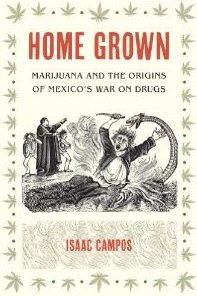On Mother's Day, mothers speak out against the drug war, in the United States and Mexico.
We review an important new book on the history of marijuana in Mexico that demands a revisionist look at the origins of Reefer Madness in America.
Oregon's medical marijuana community and national drug reformers helped defeat a former interim US Attorney in favor of a medical marijuana-friendly challenger in the Oregon Democratic Party attorney general race Tuesday. They hope the victory sends a signal across the country.
The biggest medical marijuana news this week has to be the Oregon election that saw a pro-medical marijuana attorney general candidate win against a former interim US Attorney, but there was plenty of other news, as well.
ProCon.org is a set of in-depth web sites presenting information and views from on current issues, several with relevance to drug policy. The Chronicle is currently running a series of info items from ProCon.org -- this one from sportsanddrugs.procon.org -- and we encourage you to check it out.
A bill awaiting the Kansas governor's signature would increase judges' discretion in sentencing small-time drug offenders, although it increases penalties for some major drug offenses.
Prison reform comes to Oklahoma!
Like a vampire risen from the dead, Colorado's drugged driving bill came back to life during a special session of the legislature, only to have a stake driven through its heart once again.
The Copenhagen city council had requested that the Danish government allow it to experiment with legal cannabis sales, and now the government has replied with a resounding "no."
A bill that would decriminalize drug crop cultivation in Colombia has passed a first reading in the lower house, but the government opposes it.
An unarmed Florida drug suspect who made a furtive movement during a traffic stop was shot and killed by a Jacksonville police office who unloaded seven shots at him.
We inadvertently missed a week last week, but the corrupt cops didn't.
Events and quotes of note from this week's drug policy events of years past.
On this Mother's Day, more than 100,000 women are behind bars in American prisons, according to the Bureau of Justice Statistics, and many of them are doing time for drug offenses. That's too many, said members of a new coalition, Moms United to End the War on Drugs, as they held events last week in the days running up to Mother's Day.

Gretchen Burns Bergman at the National Press Club (Moms United)
"The war on drugs is really a war on families," said Mom's United's Gretchen Burns Bergman. "It is time to end the stigmatization and
criminalization of people who use drugs and move from arrest and mass incarceration to therapeutic, health-oriented strategies. Moms were the driving force in repealing alcohol prohibition and now moms will play a similar role in ending the war on drugs."
Bergman, from San Diego, is the mother of two sons who have struggled with substance abuse and incarceration and is a founder of
A New PATH (Parents for Addiction Treatment & Healing). A New PATH has joined forces with other groups, including
Law Enforcement Against Prohibition (LEAP), the
NORML Women's Alliance,
Families to Amend California's Three Strikes, and
Students for Sensible Drug Policy to form Moms United to agitate for an end to the drug war and a turn toward sensible, evidence-based drug policies.
The week leading up to Mother's Day was a week of action under the rubric
of Cops and Moms Working Together to End Prohibition. The week saw events and press conferences in Atlanta, Boston, New York City, and Washington, DC, in the East and Los Angeles, San Diego, Oakland on the West Coast.
"Mother's Day was derived out of an intensely political effort to organize women on both sides of the Mason-Dixon Line against the Civil War," said Sabrina
Fendrick, coordinator for the
NORML Women's Alliance. "The reason mothers were made the vehicle was because they were the ones whose children were dying in that war. Women were also largely responsible for ending alcohol prohibition. This is more than just a ‘greeting-card holiday,’ this is the beginning of an institutional change in our society. The government's war on drugs is unacceptable. For our children's sake, the concerned mothers of the world are being called on to demand the implementation of a rational, responsible, reality-based drug and marijuana policy."
Last Wednesday, at a San Diego press conference, the umbrella group unveiled the
Moms United to End the War on Drugs Bill of Rights, a 12-point motherhood and drug reform manifesto which calls for "the right to nurture our offspring, and to advocate for their care and safety" and "the parental right to policies and practices that recognize addiction as a disease in need of treatment, rather than a willful behavior to be criminalized," as well as the right to have harm reduction and overdose prevention practices implemented, the right to be free from heavy-handed, constitution-threatening drug war policing, and the right to be free from drug war violence.

Moms United in Los Angeles (Moms United)
"If we stop arresting and incarcerating drug users, think of the number of children who would have the chance to look upon their parents as positive role models instead of having parents who are absent because they are incarcerated," the group said. "We have a moral and ethical obligation to give these children a better chance in life by allowing parents to take care of their families. These parents should have the opportunity to become the productive members of society and role models to their children that they want to be and that their children need and deserve."
The Bill of Rights has been endorsed by a number of religious, reform, and civil rights groups, and individuals can sign onto it, too. To sign on, go to the
online petition.
"We are building a movement to stop the stigmatization and
criminalization of people who use drugs or are addicted to drugs," the group said. "We urgently call for health-oriented strategies and widespread drug policy reform in order to stop the irresponsible waste of dollars and resources, and the devastating loss of lives and liberty."
It's not just Moms United who is using Mother's Day to strike a blow for drug reform. In Colorado, where
Amendment 64 to legalize and regulate marijuana is on the ballot, the
Campaign to Regulate Marijuana Like Alcohol is
running a television ad featuring a young woman writing an email to her mother in which she explains that she has found her marijuana use to be safer and healthier than the drinking she did in college.
The ad is aimed at a demographic that is both critical to and difficult for the campaign: women in their
30s and
40s, many of whom are mothers. The ad appeared Friday and again on Mother's Day.
"Our goal with the ad is to start a conversation -- and encourage others to start their own conversations -- about marijuana," Betty
Aldworth, the advocacy director for the campaign.
And it's not just the United States, either. In mother-honoring Mexico, which marked Mother's Day on Thursday, hundreds of women and other family members traveled to Mexico City on the National March for Dignity to demand that the government locate their loved ones gone missing in the drug wars, according to the
Frontera NorteSur news service.
"They took them alive, and alive we want them," the marchers chanted.
While the drug wars in Mexico have claimed at least 50,000 lives, including
49 people whose dismembered bodies were found on a highway outside Monterrey Sunday morning, thousands more have gone missing, either simply vanished or last seen in the hands of armed, uniformed men.
The Mexican government doesn't report on how many have gone missing in its campaign against the cartels, but the Inter-American Human Rights Commission counts more than 5,000 missing persons complaints filed with police -- and this in a country where many people so mistrust the police they don't bother to file official reports.
"For some it has been years, for others months or days, of walking alone, of clamoring in the desert of the hallways of indolent and irresponsible authorities, many of them directly responsible for disappearances or complicit with those who took our loved ones away," the mothers' group said.
On Mother's Day, many mothers in Mexico have "nothing to celebrate," said Norma
Ledezma,
cofounder of Justice for Our Daughters in Chihuahua City. "As families, we want to take this occasion to tell society not to forget that in Mexico there is home with a plate and a seat empty."
"We have walked alone in the middle of stares and stigmatizing commentaries, and we have been treated like lepers, marginalized and condemned to the worst pain a human being could live: not knowing the whereabouts of our sons and daughters," the new mother's movement declared. "But now we are not alone. We have found hundreds of mothers and we unite our clamor and our love to recover our loved ones and bring them home."
On Mother's Day, the agony of the drug war transcends borders. And the call from mothers for a more sane and human alternative continues to grow, from Chihuahua to Chicago and from Oaxaca to Washington.
back to top
Home Grown: Marijuana and the Origins of Mexico's War on Drugs, by Isaac Campos (2012, University of North Carolina Press, 331 pp., $39.95 HB)
Phillip S. Smith, Writer, Editor
For anyone with a serious interest in the history of marijuana prohibition, Isaac Campos has made an indispensable contribution to the literature with Home Grown, his scholarly work on the history of marijuana in Mexico. In so doing, he not only opens up a previously neglected area of marijuana research -- Mexico! -- but also makes a compelling case for a revisionist view of the standard narratives of pot prohibition in the United States.
Relying on archival research, access to thousands upon thousands of Mexican press articles over more than 150 years, and the latest social science insights into the social and cultural construction of narratives about drug use, as well as some groundbreaking Mexican intellectual and scientific history, the University of Cincinnati historian covers the career of marijuana in Mexico from its introduction by Spanish colonists shortly after Conquest through its prohibition throughout nationwide by the new revolutionary government in 1920.
Campos traces marijuana's arrival in Mexico to at least as far back as 1530, when one of the conquistadors was granted royal approval to import it for hemp farming. Back then, it was known as canamo, the Spanish word for cannabis. Hemp farming never really took off in Mexico, but the plant itself, a native of Southwest Asia, certainly went native, so to speak.
And that was part of pot's problem. While efforts to farm hemp had largely died out by the beginning of the 19th Century -- mainly for lack of reliable seed supplies -- knowledge of the plant spread during the colonial era among Mexico's indigenous population, which was already well-versed in the use of a wide variety of herbs and plants, including psychoactive ones. Indigenous medical and spiritual practices, which were closely tied, ran afoul first of the Inquisition, which tried to suppress them as the devil's work, and later, of modernizing Mexico, which wanted to shun its "primitive" or "degenerate" indigenous heritage for "civilized" European status.
Campos notes the first report of smoking marijuana for its psychoactive effects in 1846. By then, the plant had been thoroughly Mexicanized, so much so that it was considered indigenous and its introduction as cannabis forgotten. In fact, many observers didn't even realize that the demon weed, now becoming known as "marijuana" was the same plant as cannabis.
As Campos shows in painstaking historical detail, over the next century and a half, marijuana developed a reputation as a bringer of madness and violence, a view that was widely shared both by the indigenous masses and scientific and medical scholars. Newspaper reports of marijuana were almost exclusively and unanimously about people who had smoked it, then committed horrid crimes of violence while driven insane by its pernicious effects. Peasants were known to scream in terror or make the sign of the cross at the mere sight of the plant, associated as it was not only with madness, but with indigenous witchery.
Throughout the 19th Century, there was no counter-narrative to Mexican reefer madness (in fact, when one Mexican physician dared to challenge the orthodox view in 1938, he was nearly drummed out of the profession amid great scandal). Marijuana made you crazy, and the only people who smoked it were criminals, prisoners, and soldiers in barracks. That was the common wisdom, and it was universally supported by the science of the day.
Since running amok on weed seems so foreign to our cultural experience with the drug, Campos devotes some effort to explaining why the reports of madness and mayhem were so consistent. Did it actually make people go crazy? Here he delves into set and setting, the social construction of drug use, and the modern of science of marijuana to suggest that while people may have occasionally really rampaged on reefer, it is more likely that the reports conflated marijuana and other drug use, especially alcohol; that the existing narratives created a sort of "placebo effect" where people did what was expected of them -- go crazy on weed -- that the reports were sometimes made up to sell newspapers, and that because Mexican law provided a sort of insanity defense for people who were intoxicated, people claimed to have been under the influence to avoid criminal sanctions for their crimes.
By the late 19th Century, the repression of marijuana was underway in Mexico. First came restrictions on the sale of marijuana at herbolarias, the market herb stalls operated by indigenous women (you can still see them at the Sonora witches' market in Mexico City), then state and local bans, and in 1920, national marijuana prohibition in Mexico.
Campos' history of marijuana in Mexico is fascinating in its own right and is an outstanding contribution to the literature in itself, but he makes a real contribution to our understanding of pot prohibition in the US as well. The standard narrative, laid down by Bonnie and Whitebread in The Marijuana Conviction and Musto in The American Disease, and relied on by most later scholars, is that Reefer Madness was largely fueled by prejudice and racism toward Mexicans and their drug.
Campos shows that while anti-Mexican sentiment indeed played a role in the construction of the Reefer Madness narrative, that narrative was as much a Mexican import as the weed itself. Mexican public and scientific opinion fully embraced the "marijuana is madness" meme, English-language Mexican newspaper reports of pot atrocities were reprinted widely in the US -- sometimes the same Mexican press story would circulate for years in the US, being reprinted at different times by different newspapers, often with sensational embellishments. Mexico delivered a nicely-wrapped, full-blown Reefer Madness narrative into the eager arms of the likes of Harry Anslinger, who would use it as the basis of our very own version of Reefer Madness.
And that means we have to revise the standard narrative on the history of pot prohibition in the US. We didn't cram marijuana prohibition down Mexico's throat; the Mexicans did it themselves, and the process began long before the US began trying to impose its prohibitionist views on the rest of the world. And, as Campos makes abundantly clear, blaming it on racism directed at Mexicans is just too simple.
Home Grown is a most welcome and important contribution to the history of marijuana prohibition. It has broadened our understanding of how we got to this place, and it belongs on the book shelf of every serious student of the topic.
back to top
In an Oregon primary election where medical marijuana was a prominent campaign issue, former judge and ally of the state's medical marijuana community Ellen Rosenblum came from behind to decisively defeat former interim US Attorney Dwight Holton Tuesday in the campaign for the Democratic Party's nominee for state attorney general.

Oregon Democratic Party attorney general nominee Ellen Rosenblum (ellenrosenblum.com)
Drug reformers who aided the
Rosenblum campaign said as election results came in that they showed attacking medical marijuana patients and their distribution systems was "not a smart political move."
"As attorney general, I will make marijuana enforcement a low priority, and protect the rights of medical marijuana patients,"
Rosenblum says on her
campaign website.
According to the Oregon Secretary of State's
unofficial election results Tuesday evening, with 100% of the vote counted, Rosenblum had won with 63% of the vote, compared to 37% for Holton.
The winner of the Democratic Party nod is almost certain to be the next state attorney general. The Republicans didn't even field a candidate for the post, and in a primary where the Democratic attorney general race attracted more than 183,000 voters, the Republican non-race attracted fewer than 9,000 write-in votes.
Holton was an early favorite in the race and had the support of law enforcement constituencies, but aroused the ire of medical marijuana supporters for his actions as interim US Attorney last year, when he oversaw several raids against medical marijuana providers and sent out letters threatening asset forfeiture to other providers and their landlords. It didn't help when he called the the
Oregon Medical Marijuana Program "a train wreck" during the campaign and pledged to work with Republican legislators to "fix" it.
The state's medical marijuana and marijuana legalization advocates mobilized to defeat Holton and encourage support for Rosenblum. But national drug reform activists, heartened by the grass roots response and emboldened by the opportunity to inflict a political price on those participating in the federal crackdown on medical marijuana distribution, mobilized as well.
Through its lobbying and campaign arm, Drug Policy Action, the
Drug Policy Alliance kicked in $100,000 in donations to the Rosenblum campaign and
Citizens for Sensible Law Enforcement (CSLE), which, among other things, launched a series of radio ads against Holton. CSLE is also the group behind the
I-24 marijuana legalization initiative, one of two Oregon legalization initiatives edging very close to making the November ballot.
DPA ally and deep-pocketed drug reform donor John Sperling, founder of the University of Phoenix, also contributed $100,000 to the Rosenblum campaign.
DPA and Oregon medical marijuana advocates were quick to claim the election result showed there was a price to be paid for going against the drug reform tide. It was a message they wanted both prosecutors and the Obama administration to hear.
"Dwight Holton’s defeat in the Oregon Attorney General’s race should be taken as a clear and unambiguous message to US Attorneys around the country and to the national Democratic leadership that attacking state-approved medical marijuana programs is not a smart political move," said Jill Harris, managing director of strategic initiatives for Drug Policy Action, and a native of Eugene.
"Medical marijuana has overwhelming public support -- it is now legal in 16 US states and the District of Columbia, and national polls have consistently shown support in the 70-80% range for well over a decade. Drug war rhetoric and tactics will not be tolerated, and organizations like Drug Policy Action will be there to defend patients’ rights to safely access the medicine they need," she said in a Tuesday night statement.
No Oregon groups have yet released any statements, but there was much joy on their list serves Tuesday night. "I hope that law enforcement is paying attention as well," said one poster. "As this just goes to show that Oregon is sick of them wasting their resources on marijuana."
(This article was published by StoptheDrugWar.org's lobbying arm, the Drug Reform Coordination Network, which also shares the cost of maintaining this web site. DRCNet Foundation takes no positions on candidates for public office, in compliance with section 501(c)(3) of the Internal Revenue Code, and does not pay for reporting that could be interpreted or misinterpreted as doing so.)back to top
The biggest medical marijuana news this week has to be the Oregon election that saw a pro-medical marijuana attorney general candidate win against a former interim US Attorney, but there was plenty of other news, as well. Let's get to it:
National
Last Wednesday,
Mitt Romney got asked about medical marijuana and didn't much like the question or really answer it. "Aren't there issues of significance that you'd like to talk about?" Romney asks the interviewer. "The economy, the economy, the economy. The growth of jobs. The need to put people back to work. The challenges of Iran. We've got enormous issues that we face, but you want talk about -- go ahead -- you want to talk about marijuana? I think marijuana should not be legal in this country. I believe it is a gateway drug to other drug violations. The use of illegal drugs in this country is leading to terrible consequences in places like Mexico -- and actually in our country."
On Tuesday, a
Mason Dixon poll found broad support for medical marijuana among Republicans. Some 67% of Republicans said federal officials should respect state medical marijuana laws. So did 75% of Democrats and 79% of independents.
Also on Tuesday,
researchers reported that smoking marijuana can relieve MS symptoms. Researchers at the University of California at San Diego found that smoked marijuana relieved pain and muscle tightness spasticity. The research was published in the peer-reviewed Canadian Medical Association Journal.
Arizona
As of Monday,
Arizona started accepting dispensary applications. Arizona has some of the strictest dispensary rules in the country, including requirements that a licensed physician be employed on premises, that letters be obtained showing dispensaries are complying with zoning laws, and that they have a business plan showing they are operating as nonprofits. Then there is the $5,000 application fee and the preference that will be shown to those who can prove they have $150,000 in the bank. Still, competition is expected to be fierce for the licenses, which will be capped at 125 statewide. Interested parties have until May 25 to apply.
California
Beginning Saturday,
a medical marijuana "Unity" conference gets underway in Sacramento. It goes through Monday and is aimed in part at obtaining passage of Assembly Bill 2312 to regulate medical marijuana cultivation and distribution statewide. The conference is sponsored by the PAC Californians to Regulate Marijuana as well as Americans for Safe Access (
ASA), the United Food and Commercial Workers Union, California
NORML, the Coalition for Cannabis Policy Reform, and the Emerald Growers Association. The conference will focus on skill-building and grass roots leadership, with a day of lobbying set for Monday.
Last Thursday,
a Santa Barbara dispensary operator took a plea deal. Charles
Restivo, operator of the Pacific Coast Collective between 2008 and 2010, was arrested after a four-dispensary raid by local law enforcement in February 2010. He was charged with possession of marijuana for sale and cultivation of marijuana for sale since authorities argued the dispensary was violating state laws regarding medical marijuana. Under the deal,
Restivo pleaded guilty to one new count of possession of concentrated cannabis (hash) in return for the other charges being dropped. He will get three years probation.
Also last Thursday,
the Clear Lake city council voted to oppose Measure D, the Lake County marijuana cultivation initiative set to go before voters June 5. The council's action follows similar votes taken by the Lake County Office of Education Board of Trustees Wednesday night, the Board of Supervisors on Tuesday and the
Lakeport City Council last week. It is also opposed by the Sierra Club, the Lake County Deputy Sheriffs Association,
Kelseyville Business Association, Lake County Chamber of Commerce, California Women for Agriculture, Lake County Farm Bureau, the Buckingham and Clear Lake Riviera homeowners associations, and the Lake County Association of Realtors' Board of Directors. Measure D would allow 12 female plants to be grown in residential areas on lots under a half acre, 24 plants on lots larger than a half acre and 84 plants on larger parcels.
On Tuesday,
the DEA and local police raided a Fontana dispensary. The raiders hit Holistic Meds RX, detaining four people, and seizing large quantities of medical marijuana. It was a federal warrant, but town and San
Bernadino County police aided the DEA. Dispensaries have opened in Fontana, but have been unable to get permits because the city considers the businesses illegal.
On Wednesday,
the Los Angeles city council postponed adopting a "gentle" ban on dispensaries proposed by Councilman Jose
Huizar. The move came after Councilman Paul
Koretz instead proposing allowing some dispensaries to continue to operate if they agreed to city regulations.
Koretz called
Huizar's "gentle" ban, which would close all dispensaries, but allow personal and collective grows, in reality a "vicious, heartless" ban. The city is home to an uncertain number of dispensaries, somewhere in the hundreds.
Colorado
On Monday, 25 dispensaries targeted by federal officials had to be closed down. That was the second wave of dispensaries threatened by US Attorney John Walsh, who earlier forced 22 out of business. He says a third wave of threat letters is forthcoming. In the first wave, Walsh targeted dispensaries within 1,000 feet of schools; in the second wave, he targeted dispensaries within 1,000 feet of college campuses. No telling yet what his criteria will be next time.
On Tuesday, the Dacono city council moved forward with its ban on dispensaries, as well as grows and edibles manufacturing. The council voted 4-2 for the ban, but must do so one more time on June 11 before it takes effect. The town has had a temporary moratorium on new medical marijuana businesses since July 2010, but that edict expires on July 1. The town has three existing dispensaries, but they would be forced to close if the ban passes.
Michigan
Last Friday, the state appeals court confirmed the conviction of a man who had a medical marijuana card, but not a fence. Lewis Keller of Emmet County got busted with 15 plants on his property. Under state law, he could have 12, but it had to be fenced. Keller said he knew he was over the limit, but he didn't realize the plants had to be secured.
On Tuesday, the Jackson city council got an earful from advocates concerned about its proposed medical marijuana ordinance. Under the proposed ordinance, qualifying patients or primary caregivers who are registered by the Michigan Department of Community Health to grow marijuana could do so in their homes. Patients could consume the drug only in their homes or their primary caregivers' homes. Patients and primary caregivers also could grow medical marijuana at non-dwelling locations in certain commercial and industrial business districts.
The city has had a moratorium on medical marijuana operations during the drafting of the ordinance. The city council will revisit the issue next week.
New Hampshire
On Wednesday, the House passed a medical marijuana bill already passed by the Senate. It now goes back to the Senate for approval of changes. Gov. John Lynch (D) has vowed to veto the bill over concerns over distribution, just as he did in 2009, when a veto override failed by two votes in the Senate.
New York
On Wednesday, a Siena College poll found majority support for medical marijuana in the Empire State. The poll had 57% supporting it and only 33% opposed. A bill in the Assembly has been stalled since Gov. Andrew Cuomo (D) signaled that this was not the year for it.
Oregon
On Tuesday, Ellen Rosenblum defeated former interim US Attorney Dwight Holden in the fight for the Democratic Party nomination for state attorney general. Oregon medical marijuana activists and national drug reformers rallied against Holden and supported medical marijuana-friendly Rosenblum as she picked up 63% of the vote against the former front-runner. Activists said the vote shows opposing medical marijuana carries a political price tag.
Rhode Island
On Wednesday, the House passed compromise dispensary legislation. A similar measure has already passed the Senate, so after the formalities of concurrence votes, the measure will head to Gov. Lincoln Chafee (I), who is expected to sign it.
Washington
On Monday, the Pasco city council moved closer to banning grows. A workshop discussion that night leaves little doubt that the city will outlaw medical marijuana gardens in the city at its next meeting to avoid violating federal anti-drug laws. Pasco is among Washington cities that have been waiting for nearly a year for the legislature to act to clarify a law allowing cities to write their own rules for medical marijuana garden collectives. The council is expected to vote on the ordinance Monday.
(This article was published by StoptheDrugWar.org's lobbying arm, the Drug Reform Coordination Network, which also shares the cost of maintaining this web site. DRCNet Foundation takes no positions on candidates for public office, in compliance with section 501(c)(3) of the Internal Revenue Code, and does not pay for reporting that could be interpreted or misinterpreted as doing so.)
back to top
Did you know that historical references to drug use in sports goes back to the 8th century BC? Read about the practices and issues from ancient times through the present, in Historical Timeline -- History of Performance Enhancing Drugs in Sports, on http://sportsanddrugs.procon.org, part of the ProCon.org family.
Follow Drug War Chronicle for more important facts from ProCon.org over the next few weeks, or sign up for ProCon.org's email list or RSS feed. Click here for last week's Chronicle Did You Know segment.
ProCon.org is a web site promoting critical thinking, education, and informed citizenship by presenting controversial issues in a straightforward, nonpartisan primarily pro-con format.

back to top
A bill that would ease penalties on some small-time drug offenders has been approved by the Kansas legislature and awaits the governor's signature. The bill, House Bill 2318, won final approval in the House Monday on a 94-23 vote.

Kansas state capitol, Topeka (wikimedia.org)
The bill would give judges more discretion when sentencing drug offenders for small-time possession or dealing to support their own habits, if they have no more than a single prior conviction on their record.
Under the current Kansas sentencing scheme, drug offenses are determined by a sentencing grid, and drug possession and small-time dealing offenses are considered "presumptively prison" sentences. That means judges currently have to state specific findings if they want to depart downward from the grid by handing out a lesser sentence.
The bill creates a "border box" on the grid, which would allow judges to order drug treatment or a lesser sentence without having to formally justify such a decision.
The bill also creates harsher penalties for big-time drug manufacturing or sales, but legislators said those big cases are more likely to be prosecuted by federal authorities.
Kansas has been wrestling with ways of reducing its prison population in recent years, and passage of this bill is another move in that direction.
back to top
Oklahoma Gov. Mary Fallin (R) last Thursday signed into law a bill designed to lower the state's prison population. The state's incarceration rate is first in the nation for female prisoners and third highest for males.

Oklahoma State Penitentiary, McAlester (wikimedia.org)
The bill,
House Bill 3052, is expected to control the increase in prison growth by increasing substance abuse treatment, reducing violent crime, strengthening supervision, and reducing recidivism. The aim is to reduce prison costs, which have risen 41% in the past decade, while the prison population increased 15% and violent crime decreased 4%.
The bill requires substance abuse and mental health screening of defendants before they are sentenced so those who need treatment will be able to access it. It also requires that all freed prisoners do at least nine months of parole in a bid to reduce recidivism. And it provides for "intermediate revocation facilities" for parole and probation violators short of sending them back to prison. A measure that would have effectively reduced some sentences by allowing good time to accrue from the beginning of the sentence was dropped in the face of legislative opposition.
"Increasing public safety is a top priority of my administration and a primary function of state government. The reforms in
HB 3052 will help to reduce crime and ensure our streets are safer for Oklahoma families,"
Fallin said in a
signing statement. "In addition to lowering crime rates, reducing the incarceration rate and giving law enforcement more resources to fight crime, this bill will help us to save taxpayer dollars by helping our corrections system operate in a more efficient and effective way."
The bill was the result of years of effort by House Speaker Kris Steele (R-Shawnee) and Senate President Pro
Tem Brian
Bingman (
R-Sapulpa), who shepherded it through the legislature. It came as part of the
Oklahoma Justice Reinvestment initiative, a project of the Council of State Governments' Justice Center designed to enact "smart on crime" policies.
"Today marks the beginning of a tougher, smarter fight against crime," said Steele. "Police will get more resources, offenders will be held more accountable, prisons will have the space to incarcerate dangerous criminals and Oklahoma will be much safer as a result. We’re thrilled to have been part of the unprecedented collaboration across our entire criminal justice system that has delivered this meaningful law to the people of Oklahoma."
"We've made a historic public safety reform that puts Oklahoma's broken criminal justice system back on a sustainable path," said
Bingman. "By being both tough on crime and fiscally conservative, this law will reduce violent crime, give crime fighters the tools to do their job and ensure our criminal justice system keeps Oklahoma families and communities safe."
The new law goes into effect November 1.
back to top
The third time wasn't the charm for Colorado legislators trying to pass a "per se" drugged driving bill aimed directly at marijuana users. The bill died last year in the Senate, it died this year in the House, and on Tuesday, it died once again after Gov. John Hickenlooper (D) brought it back for consideration during a short-lived special session he called to deal with unfinished business.
The bill,
House Bill 12S-1005, would have mandated that anyone found driving with more than five
nanograms of THC per milliliter of blood was presumed to be guilty of driving while impaired. Prosecutors would have needed no other evidence of actual impairment to win a conviction.
The bill failed by a single vote in the Senate Tuesday, with senators split 17-17 on the measure. The bill had already won approval earlier in the day in the House.
The bill was opposed by medical and recreational marijuana advocates and some members of the state legislature, even some Republicans, who argued that it unfairly targeted pot users with a scientifically uncertain measure of impairment.
"I don't think it'll make our roads any safer," said Sen. Pat
Steadman (D-Denver).
Once again, only one vote made the difference. Will the legislature now give up on its quest to criminalize marijuana users who drive? We'll have to check back next year.
back to top
There will be no hash bars or cannabis cafes in Copenhagen at any time in the near future. Over the weekend, the Danish government rejected Copenhagen's request to experiment with legalizing cannabis sales in the city.

downtown Copenhagen (wikimedia.org)
In a letter to the Copenhagen city council, Social Democratic Justice Minister
Morten Bødskov wrote that the government was rejecting the request because it feared it would lead to increased availability and use of the herb and because it had been linked to a variety of side effects.
"Because of this the government will not permit the experiment,"
Bødskov wrote.
City council members, who had overwhelmingly supported the request, said they were disappointed in the decision.
"It’s very disappointing," councilman and deputy mayor for social affairs
Mikkel Warming told public broadcaster DR. "The prohibitive policies we have operated under in Denmark for so many years have not worked. You can still buy hash on street corners across the city which also means the hash is mixed up with other harder drugs. Criminals also pocket about two billion
kroner a year from the trade."
Warming said he would continue to work for marijuana legalization and counseled patience, noting that it took a decade for parliament to approve a supervised injection room for hard drug users.
"Legalization would limit the gang conflict and it would also give us access to the group of users who have been left to the criminal environment," councilman Lars Aslan Rasmussen told
Ritzau. "We had hoped that they would take our proposal seriously, as we have the support of 80% of the city council. Copenhagen has a serious problem because the gang conflict is a result of the trade in marijuana. The gangs turn over more money than 7-Eleven."
With the action by the Danish government, the black market profits of Denmark's hash slingers and pot dealers will remain safe for now.
back to top
A the first draft of a bill that would decriminalize the cultivation of illegal drug plants in Colombia, including coca, opium poppies, and marijuana, was approved by its lower house of congress last Wednesday, according to Colombia Reports.

coca eradication plane spraying herbicides in Colombia (wikimedia.org)
An incident in the country's northeast that same day underscored the need for a new approach in Colombia.
Suspected leftist guerrillas attacked a police coca eradication team, leaving at least seven dead and 12 wounded. Police sources blamed fighters of the
FARC, which has been engaged in an insurgency against the central government since 1964 and finances its operations at least in part through the coca and cocaine trade, for the attack in North Santander province.
Rep. Hugo Velazquez, who sponsored the bill, said the country cannot progress with "the failed drug policy pursued by Colombia and the United States."
Since the adoption of Plan Colombia in 1999, the US has spent more than $7 billion to fight the drug war in Colombia. While the effort has had some success -- the number of hectares cultivated is down from its peak early in the last decade -- that success has come at a high cost, not only in dollars, but in lives lost in the conflict, hundreds of thousands of internal refugees, and environmental damage from spraying crops with herbicides.And while, according to the
UN Office on Drugs and Crime, total cocaine production has declined by about one-third in the past decade, coca cultivation has increased in Peru, where its extent may now exceed Colombia's.
Under current Colombian law, persons convicted of growing illicit drug crops face between four and 12 years in prison. Of the 105,000 people in prison in the country, some 23,000 are there for either growing or trafficking in drugs.
"The important thing is that we have the opportunity to listen to congressmen from drug producing regions and hear from different government officials, not just those in opposition [to the bill] with Minister of Justice Juan Carlos
Esguerra," Velazquez said, adding the drug crop production is an agricultural issue as well as a legal one.
While Colombian President Juan Manuel Santos has been a loud advocate of putting drug policy reform on the international agenda, he has been less interested in his own country leading the way. That position was reflected by Justice Minister
Esguerra, who reiterated that the government is staunchly opposed to the bill.
The country is at a "turning point in the fight against drugs" and this is not the time to make policy changes, he said. "It's not the time to anticipate a set of rules on this issue. This cannot work like the Lone Ranger," he added.
But the bill remains alive.
back to top
A Jacksonville, Florida, police officer shot and killed an unarmed drug suspect during a traffic stop early last Wednesday morning when the man reached down inside his car. Davinian Darnell Williams, 36, becomes the 28th person to die in domestic drug law enforcement operations so far this year.

Davinian Darnell Williams (JCSO)
, Officer Jeff Edwards pulled over Williams for "driving suspiciously in a[n]… area known for drug activity." Williams tried to evade Edwards by making sudden turns and running stop signs.
When Williams finally stopped, the chief said, he refused commands to show his hands and was moving around inside the vehicle. Officer Edwards moved from one side of the car to the other to get a better view of what Williams was doing.
"At that time, the suspect made a sudden motion, reaching down," Hackney said.
Edwards then opened fire, shooting seven times through a side window and hitting Williams with six of the shots. Williams died at the scene.
Police found 17 grams of powder cocaine in one of Williams' socks and less than a gram of crack cocaine in the other. There was no weapon on Williams or in the car.
Williams had a criminal record dating back to 1992, including possession of marijuana, sale and possession of cocaine, resisting arrest, and battery on a law enforcement officer.
Officer Edwards has been placed on administrative leave while the State's Attorney's Office investigates.
Williams' killing was the seventh shooting by Jacksonville police this year and the fourth fatal one. In 2010 and 2011, Jacksonville police shot eight people each year, and in both years, four of them died.
"These traffic stops are filled with inherent dangers," Hackney said.
back to top
We inadvertently missed a week last week, but the corrupt cops didn't. Let's get to it:
In
Hanford, California,
a Hanford police officer was arrested May 3 on drug charges. Officer Ernesto
Servin, 30, was arrested when he arrived for work at the police department and police found
Oxycontin, methamphetamine, and marijuana in his car. Authorities suspect he got the drugs from arrests he made and cases he worked as a
Hanford Police officer. He is charged with falsifying police reports and drug possession. He resigned from the department the same day.
In Newark, New Jersey,
a former Newark police officer was convicted last Friday of shaking down drug dealers for cash, guns, and dope.
Darious Smith was indicted in 2004 along with half a dozen other
Neward police officers, and a jury found him guilty of conspiracy to commit official misconduct, official misconduct and theft. Five witnesses, including a former patrol partner, testified that he stole cash from dealers and planted guns and drugs on them.
In Miami,
a former Hialeah Gardens police officer was convicted Monday of ripping off marijuana dealers and selling their stashes. Lawrence Perez, 44, and four other area men stole 10 pounds in one faked traffic stop and 14 pounds in another. They were also plotting to hit a major marijuana grow, but the FBI, DEA, and Miami-Dade police were onto them by then. Perez, a former detective, is looking at up to 40 years in federal prison. He will be sentenced July 26.
In Hartford, Connecticut,
a former New York police officer was sentenced last Friday to 37 months in federal prison for taking bribes to let a drug courier go unmolested through a New York airport. Former Westchester County police officer Michael Brady, 36, took $20,000 in payoffs from drug dealers. He had earlier pleaded guilty to charges of extortion and receiving a bribe. Brady had been assigned to the Westchester County Airport, where a drug dealer regularly passed traveling between Connecticut and Florida. Brady went down after the dealer got caught up in a federal investigation of his
oxycodone smuggling ring.
In Brownsville, Texas,
a former reserve law enforcement officer was sentenced Monday to 13 year in federal prison after he was caught coming over a bridge from Mexico with 20 pounds of cocaine and heroin. Mercedes Perez, 55, was a
Nueces County Constable's reserve officer when he got caught. He was convicted of conspiracy to possess with the intent to distribute heroin and cocaine and possession with intent to distribute heroin and cocaine.
back to top
May 18, 1971: Tapes released years later reveal that sometime between 12:16pm and 12:35pm, President Nixon says to entertainer Art Linkletter, "... radical demonstrators that were here... two weeks ago... They're all on drugs, virtually all."
May 19, 1988: Carlos
Lehder is convicted of drug smuggling and sentenced to life in prison without parole, plus an additional 135 years. He had been captured by the Colombian National Police at a safe house owned by Pablo Escobar and extradited to the US.
May 20, 1991: The domestic heroin seizure record is set (still in effect today) -- 1,071 pounds in Oakland, California.
May 20, 1997: Eighteen year-old
Esequiel Hernandez,
Jr., of Redford, Texas, becomes the first American to be killed on American soil by US soldiers in peacetime when he is shot on his own property by camouflaged Marines involved in a Joint Task Force-6 border drug interdiction operation. No drugs are found. Hernandez had never been suspected of or arrested for any criminal or drug-related activity.
May 22, 1997: Milwaukee, Wisconsin, Mayor John
Norquist signs a measure into law decriminalizing first time possession of small amounts of marijuana after the proposal squeaks by the city council.
May 23, 2000: Eighty-five US troops arrive in Guatemala to participate in the two-week-long "Operation Maya Jaguar," intended to provide training for Guatemalan police, to carry out seizures of illegal drug shipments, and to facilitate joint
counternarcotics operations.
May 17, 2001: Canada's House of Commons passes a unanimous motion to create a committee to examine the issue of non-medical drugs in Canada. Members of all five parties say they intend to discuss legalization, or at least decriminalization, of marijuana as part of a sweeping look at the country's drug strategy.
May 21, 2001: Geraldine
Fijneman, head of the Amsterdam branch of the
ayahuasca-using Santo
Daime church, is acquitted by a Dutch court.
Fijneman had owned, transported and distributed a
DMT-containing substance, but the court ruled that her constitutional right to Freedom of Religion must be respected.
May 22, 2003: Maryland becomes the ninth state to relax restrictions on medicinal marijuana use for seriously ill patients when Governor Robert L. Ehrlich,
Jr. signs a bill reducing the maximum penalty to a $100 fine. The law goes into effect on October 1. Ehrlich, the first Republican governor to sign a bill relaxing penalties for medicinal use of marijuana, signs the measure despite pressure from the Bush administration to veto it.
back to top













